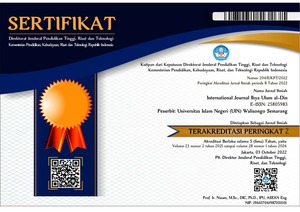Karl Popper's Falsification Theory of the Determination of the Gregorian Calendar Based on the Book of Risalatul Falakiyah K.H Misbachul Munir
DOI:
https://doi.org/10.21580/ihya.25.2.18178Keywords:
Karl Popper's falsification, Gregorian Calendar, Risalatul Falakiyah, K.H. Misbachul MunirAbstract
The book of Risalatul Falakiyah is the work of KH. Misbachul Munir has a unique side compared to the Gregorian Calendar in general. This uniqueness is seen at the start of the calculation of the day and the market, namely Tuesday Pahing, while the count generally starts on Sunday Legi. This article aims to analyze the total of the Gregorian Calendar based on the book of Risalatul Falakiyah based on Karl Poper's falsification theory and analyze the accuracy of the comparison between the concept of calculating the Gregorian Calendar of the book of Risalatul Falakiyah using contemporary calculations based on technology. This research uses library research by conducting qualitative-descriptive analysis of data collected through documentation and interviews. The results showed: First, based on Karl Popper's falsification theory that the Gregorian calendar calculation theory of the book of Risalatul Falakiyah by K.H Misbachul Munir was proven by its correctness by comparing and testing its calculations with the standard formula of science obtained the same results. Second, based on the comparison and testing of technology-based calendar masehi calculations with mawaqit, it was found that the calendar calculation results from the book of Risalatul Falakiyah had the same accuracy as the calculation of mawaqit software.
Downloads
References
Azhari, S. (2005). Ensiklopedi hisab rukyat. Pustaka Pelajar.
Butar-butar, A. J. R. (2018). Pengantar Ilmu Falak: Teori, Praktik, dan Fikih (1st ed.). Rajawali Pers.
Butar-Butar, A. J. R. (2014). Kalender: Sejarah Dan Arti Pentingnya Dalam Kehidupan. Semarang: Cv. Bisnis Muia Konsultama.
Darsono, R. (2010). Penanggalan Islam, Tinjauan Sistem, Fiqih dan Hisab Penanggalan. Yogyakarta: Labda Press.
Farah, L. A., Saifulloh, M., & Roesuldi, J. (2022). Studi Komparasi Sejarah dan Aturan Kalender Tahun Masehi: Julian dan Gregorian. AL-AFAQ: Jurnal Ilmu Falak Dan Astronomi, 4(1), 65–77.
Hambali, S., & Rokhmad, A. (2011). Almanak sepanjang masa: sejarah sistem penanggalan masehi, hijriyah dan jawa. Program Pascasarjana IAIN Walisongo Semarang.
Heribdp. (2021). Post-Modernism: Krusialitas Falsifikasi Karl Popper. Artikula.Id. artikula.id/heribdp/falsifikasi-karl-popper/#.
Jannah, E. U. (2023). Date Of Easter Sebagai Reformasi Kalender Masehi. AL-AFAQ: Jurnal Ilmu Falak Dan Astronomi, 5(1), 109–119.
Mughits, A. (2016). Kajian Ilmu Falak di Pesantren Salaf di Jawa Tengah dan Jawa Timur. Asy-Syir’ah: Jurnal Ilmu Syari’ah Dan Hukum, 50(2), 379–398.
Muhajir, M., & Fathudin, F. (2023). Epistemologi Keilmuan KH. Misbachul Munir Ahli Falak Salamkanci Bandongan Magelang. Jurnal Alwatzikhoebillah: Kajian Islam, Pendidikan, Ekonomi, Humaniora, 9(2), 334–340.
Muhyiddin, K. (2004). Ilmu Falak dalam Teori dan Praktik. Yogyakarta: Buana Pustaka.
Popper, K. R. (2017). Logika Penemuan Ilmiah.
Riza, M. H., & Izzuddin, A. (2020). Pembaruan kalender masehi Delambre dan implikasinya terhadap jadwal waktu Salat. Ulul Albab: Jurnal Studi Dan Penelitian Hukum Islam, 3(2), 163–184.
Rohmah, N. (2019). Dinamika Almanak Masa Pra Islam Hingga Era Islam; Studi atas Penanggalan Sistem Solar, Lunar dan Luni-Solar. QALAMUNA: Jurnal Pendidikan, Sosial, Dan Agama, 11(2), 157–172.
Sabda, A. (2019). Ilmu Falak, Rumusan Syar’i dan Astronomi. Bandung: Persis Pers.
Saksono, T. (2007). Mengompromikan Hisab Rukyat. Jakarta: Amythas Publicita.
Sari, I. P. (2022). Analisa Pergeseran Kalender Gregorian Menjadi Kalender Dunia. AL-AFAQ: Jurnal Ilmu Falak Dan Astronomi, 4(1), 20–31.
Downloads
Published
How to Cite
Issue
Section
License
By submitting an article to the journal, the author(s) agree to transfer the published article's copyright to the journal, which will act as the publisher. This means the journal will have the right to publish the article in various forms, including reprints. The journal will maintain the publishing rights to the published articles.
This work is licensed under Creative Commons Attribution-ShareAlike 4.0 International License.
In line with the license, authors and third parties (readers, researchers, and others) are allowed to share and adapt the material. In addition, the material must be given appropriate credit, provided with a link to the license, and indicated if changes were made. If authors remix, transform or build upon the material, authors must distribute their contributions under the same license as the original.



